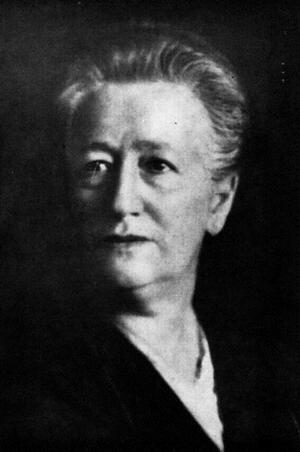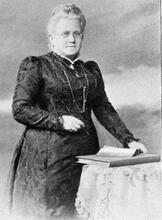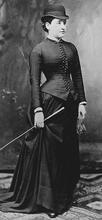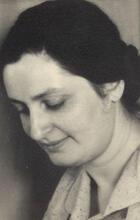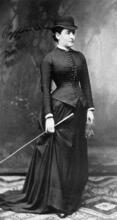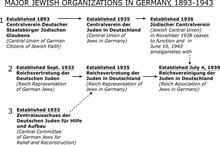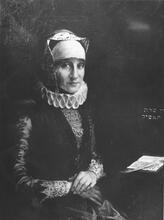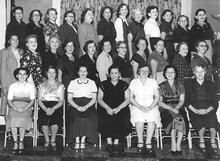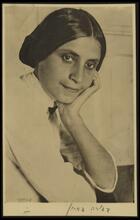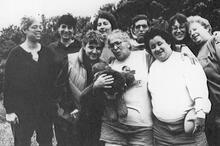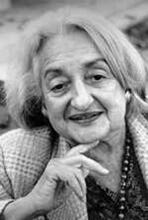Henriette Fürth
Journalist Henriette Furth, photo courtesy of Wikimedia Commons.
Despite facing ongoing anti-Semitism, journalist Henriette Katzenstein Fürth remained a passionate and vocal German patriot throughout her life. She began publishing articles on social criticism while raising eight children, eventually writing 200 articles and 30 monographs, earning both an income and a reputation for insightful journalism. In 1901 she co-founded the Women’s Care Association, and Fürth was also active in advocating for maternity leave and preventing the persecution of gays and lesbians. From 1919 to 1924 she served on the Frankfurt municipal council, and in 1932 she was honored by the city of Frankfurt for her 70th birthday. In the prevailing anti-Semitic environment of 1938, however, her death went unremarked, and two of her daughters later died in the Holocaust.
Family and Education
Henriette Fürth grew up in an elegant quarter of Giess, where her Jewish family at first encountered discrimination. Her father, Siegmund Katzenstein, was a timber merchant, married to Sophie, née Loeb. Even in the first years of elementary school Henriette Fürth felt herself excluded, but she asserted herself, developed a fighting spirit and decided never to deny her Jewish origins. After completing her studies at a high school for girls, her father consented to her attending the Elisabethschule in Frankfurt, which had a teachers’ seminar attached to it, but he withdrew his permission even before she began her studies there, since as a Jew his daughter had no chance of employment.
Writing and Activism
Henriette Fürth compensated for this lack of complete and demonstrable professional training after her marriage, when she moved to Frankfurt. She studied social economics at the Freier Deutsche Hochstift (Free German Higher Institute), where she began investigating women’s work in the home. Although as a mother of eight she was severely burdened by domestic duties, with the encouragement of her brother, Simon Katzenstein, she published articles of social criticism. In time she succeeded in earning a much-needed income as a highly regarded lecturer and journalist. Apart from a volume of poetry, Vineta (1911), she produced some two hundred articles and thirty independent publications. At the same time, she was involved in all the contemporary issues related to women: the protection of children and mothers; household problems; the decline in population and public health. In her last major work, Die Regelung der Nachkommenschaft als eugenisches Problem (Birth control as a eugenics issue, 1929), she discussed the possibility of preventing parenting by people with inherited diseases. An advocate of collaboration with radical bourgeois feminists, Fürth was active in the League for the Protection of Mothers, which took an active part in opposing persecution of homosexuals and lesbians, a stance which was more liberal than that of the social democrats as a whole.
Facing Anti-Semitism
In addition to publishing, Fürth found time to be involved in organizational life. Although not a believing Jew, she sought to find a way of introducing her wide range of knowledge and her sense of responsibility in Jewish circles. In 1901, together with Bertha Pappenheim, an orthodox Jew, she founded the Weibliche Fürsorge (Women’s Care) Association. However, considerable differences of opinion between the two women prevented fruitful collaboration. Highly sensitive, Fürth noted antisemitic tendencies in German society. She defended herself against personal antagonism proudly and with almost excessive self-confidence. She urged her children to gain the admiration of non-Jews by above-average contributions in social and cultural spheres: “Jews have to contribute more than the others. You have to be more charitable than they—protectors of the weak, a fighter for truth and justice, clever as a snake and harmless as a dove.”
During World War I, together with her daughters, Fürth established a War Kitchen for the poor and took on duties at the Information Center of the municipal food office, working till she was exhausted. Her sons Sigmund and Walter were severely wounded at the front. In consequence, she was appalled by the 1916 “Judenzählung,” which investigated the number of Jews in the combat units: “Go and count them. Count the buried and the crippled of this ghastly war, as well. Go there and count. You’ll have our help in counting the Jews’ acts of charity and the Jewish fighters for spiritual victory. …”
With the establishment of women’s suffrage, she became a candidate for the National Assembly, but was not elected. From 1919 to 1924 she was a Social-Democratic member of the Frankfurt municipal council. On reaching her seventieth birthday in 1932 she was honored by both the city of Frankfurt A.M. and its university, but her death in Bad Ems in 1938 went unnoticed by the public. Her daughters Else and Anne Adelaar were killed at Sobibor and Auschwitz.
Selected Works
Die Fabrikarbeit verheirater Frauen. Frankfurt a. M.: 1902.
Die Mutterschaftsversicherung. Jena: 1911.
Vineta. Dichtungen. Leipzig: 1911.
Die Regelung der Nachkommenschaft als eugenisches Problem. Stuttgart: 1929.
Angress, Werner T. “The German Army’s Judenzählung of 1916.” The Leo Baeck Institute’s Year Book 23 (1978): 117–135.
Fassman, Maya. Jüdinnen in der deutschen Frauenbewegung 1865–1919. Hildesheim: 1994.
Graulich, Monika, Claudius Härpfer, and Gerhard Wagner, eds. Introduction by Helga Krohn. Henriette Fürth: Streifzüge durch das Land eines Lebens: Autobiographie einer deutsch-jüdischen Soziologin, Sozialpolitikerin und Frauenrechtlerin (1861-1938). Commission for the History of the Jews in Hesse: 2010.
Katzenstein, Simon. Henriette Fürth. Versuch einer Würdingung. Zu ihrem siebzigsten Geburtstag gewidmet von ihrem Bruder. MS. Berlin: 1931.
\Krohn, Helga. “‘Du sollst Dich niemals beugen’: Henriette Fürth, Frau, Judin, Sozialistin.” In Freimark, Peter, (ed.) Juden in Deutschland. Emanzipation, Integration, Vergolgung und Vernichtung. Hamburg: 1991, 326–343.
Jüdische Frauen im 19. Und 20. Jahrhundret: Lexikon zu Leben und Werk. Edited by Jutta Dick and Marina Sassenberg. Rowohlt, Reinbek, 1993.

